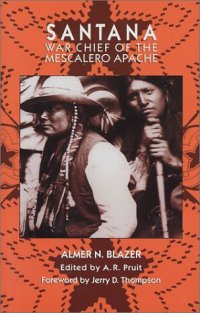
Ebook: Santana: War Chief of the Mescalero Apache
Author: Almer N. Blazer
- Tags: African-American & Black, Ethnic & National, Biographies & Memoirs, Historical, Africa, Asia, Canadian, Europe, Holocaust, Latin America, Middle East, United States, Biographies & Memoirs, Native American, Americas, History, Native American Studies, Specific Demographics, Social Sciences, Politics & Social Sciences
- Year: 2000
- Publisher: Dog Soldier Pr
- Edition: Reprint
- Language: English
- epub
Santana needed a friend from whom he could learn about the ways of the white world and who would intercede for him with the alien culture. He found that friend in J. H. Blazer, who operated a mill, La Manquina, later to become known as Blazer's Mill, on the Rio Tularoso at a site one-half mile downstream from the present-day Mescalero Agency. After their tension-fraught initial meeting in late 1867 or early 1868, the two men learned to like and respect one another and developed an abiding friendship that lasted until Santana's death from pneumonia in the winter of 1877. The manuscript itself contains both accounts of J.H. Blazer's interactions with Santana and descriptions of certain aspects of Mescalero life and culture supplied from the experience of the author, A.N. Blazer, son of J.H., and from stories told him by his Mescalero acquaintances, some of whom were contemporaries of Santana.
This is not an academic history. Any reader expecting such an account will be disappointed. Many of the events and conversations related herein cannot be verified because they come from the memories of people who had no written language (and who, it should be noted, had far better memories as a result). What is presented here is a very cogent account, verifiable in many important particulars, of a remarkable man and certain aspects of the Mescalero culture which spawned and shaped him.
Santana was a remarkable man for any age or time. Recognizing his own limitations in dealing with an Anglo juggernaut bent on overwhelming and destroying his culture and his people, he was able to step outside his cultural heritage of war and conquest and use his exceptional skills as a tactician, negotiator and leader to find a way to preserve both with a minimum of bloodshed. In this age of increasingly violent cultural and religious conflicts in many parts of the world, surely his story deserves substantial recognition.